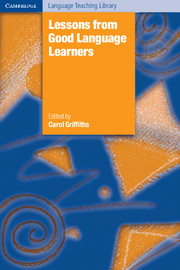Book contents
- Frontmatter
- Contents
- List of contributors
- Acknowledgements
- Editor's overview
- Prologue
- Reflections
- Part I Learner variables
- Part II Learning variables
- 12 Vocabulary and good language learners
- 13 Grammar and good language learners
- 14 Functions and good language learners
- 15 Pronunciation and good language learners
- 16 Listening and good language learners
- 17 Speaking and good language learners
- 18 Reading and good language learners
- 19 Writing and good language learners
- 20 Teaching/learning method and good language learners
- 21 Strategy instruction and good language learners
- 22 Errors correction and good language learners
- 23 Tasks and good language learners
- The learners' landscape and journey: a summary
- Index
12 - Vocabulary and good language learners
Published online by Cambridge University Press: 11 August 2009
- Frontmatter
- Contents
- List of contributors
- Acknowledgements
- Editor's overview
- Prologue
- Reflections
- Part I Learner variables
- Part II Learning variables
- 12 Vocabulary and good language learners
- 13 Grammar and good language learners
- 14 Functions and good language learners
- 15 Pronunciation and good language learners
- 16 Listening and good language learners
- 17 Speaking and good language learners
- 18 Reading and good language learners
- 19 Writing and good language learners
- 20 Teaching/learning method and good language learners
- 21 Strategy instruction and good language learners
- 22 Errors correction and good language learners
- 23 Tasks and good language learners
- The learners' landscape and journey: a summary
- Index
Summary
At one time the teaching of vocabulary was unfashionable, and it was widely assumed that lexical acquisition could be left to look after itself (Nation, 1990). More recent years, however, have seen renewed recognition of the importance of vocabulary when learning a new language (Griffiths, 2003, 2006). Dating back to around the time that Rubin's article on the good language learner was published in 1975, there has been a more learner-focused view of education. In line with this perspective, there has been increasing interest not only in what is being learnt, but also in language learners themselves, and how they approach the task of learning.
In order to take control of their vocabulary learning, learners need to know what vocabulary to learn, how to go about learning it, and how to assess and monitor their progress. This vocabulary requires a range of learning strategies, such as learning the vocabulary of the subject area (Chung, 2003; Chung and Nation, 2003; Coxhead, 2000) or guessing from context (Nagy, Herman and Anderson, 1985). There are also deliberate learning strategies such as word part analysis, learning using word cards and dictionary use (Nation, 2001) that are important shortcuts to vocabulary growth. Corson (1997), furthermore, argues that new vocabulary needs to be learned both receptively and productively because it is by productive use of such vocabulary that learners signal that they have become part of their particular communities.
- Type
- Chapter
- Information
- Lessons from Good Language Learners , pp. 159 - 173Publisher: Cambridge University PressPrint publication year: 2008
- 3
- Cited by



